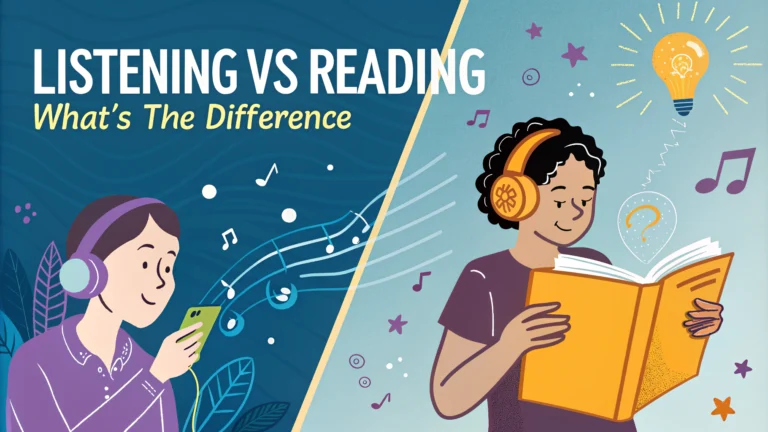The brain processes written and spoken information differently, leading to unique benefits for each method of consuming content. Understanding these differences helps make better choices about when to read versus when to listen.
Both skills complement each other in the learning process, but each has distinct advantages for different situations and learning styles. Knowing when to use each method can significantly improve information retention and learning efficiency.
Understanding the Cognitive Processes
- **Reading** activates visual processing centers in the brain
- **Listening** engages auditory processing pathways
- Different memory systems are activated for each method
Speed and Control Benefits
| Reading | Listening |
|---|---|
| – Control over pace – Easy to review – Quick scanning |
– Hands-free learning – Natural pacing – Tone interpretation |
Memory and Retention Factors
- **Active reading** typically leads to better retention for complex topics
- **Auditory learning** can be more effective for language acquisition
- **Combined approaches** often yield the best results
Practical Applications and Situations
> “Choose your learning method based on the task at hand. Technical content often benefits from reading, while narrative content can be perfect for listening.”
- **Technical material**: Better suited for reading
- **Stories and narratives**: Often more engaging through listening
- **Language learning**: Benefits from both methods
Reading vs Listening: Learning Preferences That Matter
Understanding Your Learning Journey
Reading and listening represent two primary ways our brains process information. Each method shapes how well we understand and remember content, making the choice between them significant for effective learning.
The Science Behind Information Processing
• **Visual processing** engages different brain regions than auditory learning
• **Reading** typically activates left-brain analytical functions
• **Listening** stimulates language and memory centers
When Reading Works Best
- **Complex topics** requiring deep focus
- **Technical material** with charts or diagrams
- **Reference materials** you’ll need to review
Optimal Listening Scenarios
| Best For | Examples |
|---|---|
| Multitasking activities | Commuting, exercise, housework |
| Narrative content | Stories, biographies, fiction |
| Tone-dependent material | Language learning, speeches |
Maximizing Memory Retention
> “Your brain retains information differently based on how you consume it. Match your learning method to your goal.”
- **Take notes** while reading for better recall
- **Record key points** from audio content
- **Practice active recall** with both methods
Combining Both Methods
• Read along while listening to boost comprehension
• Switch between methods based on energy levels
• Use audiobooks with text follow-along
Tools and Resources
- **Reading apps**: Kindle, PDF readers
- **Audio platforms**: Audible, Spotify
- **Hybrid tools**: Immersive reader, ReadAloud
Creating Your Learning Strategy
Pick the right method based on:
• Your learning goals
• Available time and environment
• Content complexity
• Personal preference and learning style
Remember: The best approach often combines both reading and listening, adapting to your specific needs and circumstances.
Frequently Asked Questions About Listening vs Reading
Is listening or reading better for learning?
Both methods have distinct advantages. Reading typically offers better comprehension and retention for complex material, while listening can be more effective for:
- Learning pronunciation
- Multitasking scenarios
- Developing speaking skills
Why do people retain more information when reading vs listening?
Reading comprehension tends to be higher because:
- Readers can control their pace
- Visual memory reinforces learning
- Re-reading difficult passages is easier
- Active engagement with text is more common
Which is faster: reading or listening to audiobooks?
The average person reads at 250-300 words per minute, while audiobooks are typically narrated at 150-160 words per minute. Reading is generally faster unless listening speed is increased.
Does listening to audiobooks count as reading?
While both activities expose you to the same content, they engage different cognitive processes. Audiobook listening activates similar language processing areas but doesn’t involve visual text decoding.
What burns more calories: reading or listening?
Reading burns slightly more calories (1.3 calories per minute vs 1.0) due to increased eye movement and cognitive engagement.
Are there benefits to combining reading and listening simultaneously?
Immersion reading (reading while listening) can:
- Improve pronunciation
- Enhance comprehension
- Speed up language learning
- Help with focus and attention
Which method is better for memory retention: reading or listening?
Reading typically leads to better retention due to:
- Active engagement with material
- Visual memory formation
- Self-paced learning
- Easier review of content
What are the best uses for listening vs reading?
Best for listening:
- Entertainment while multitasking
- Language pronunciation
- Light content consumption
Best for reading:
- Technical material
- Complex subjects
- Study and research
Which learning style is better for visual learners?
Reading is generally more effective for visual learners as it provides text-based visual input and allows for spatial organization of information.
What’s the difference in brain activity between reading and listening?
While both activate similar language processing areas, reading engages additional visual processing regions and typically shows higher activity in areas associated with memory formation.



















